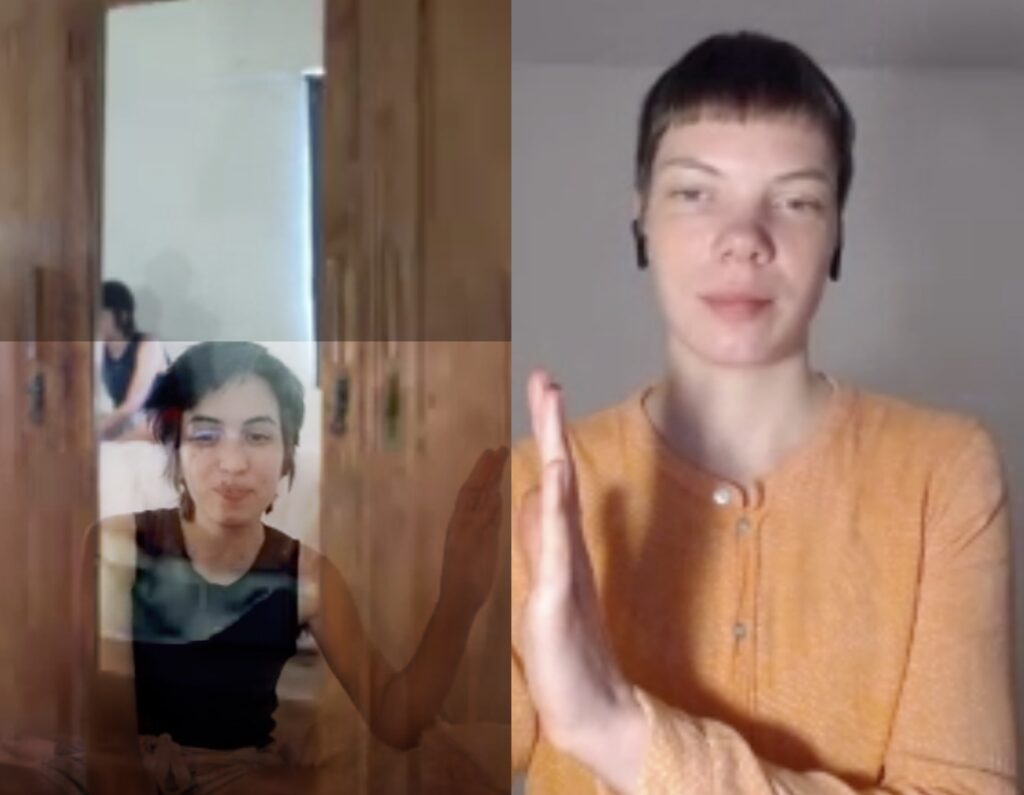Jucan’s Latest Piece Explores More Expansive Ways of Being Political

In an era when the gulf between left and right can feel too wide to bridge, how can we have conversations across the divide without screaming?
In Left and Right, or Being Who/Where You Are, Ioana Jucan, assistant professor in the Marlboro Institute of Liberal Arts and Interdisciplinary Studies and an instructor in the Business of Creative Enterprises program, has created and directed an interactive, online devised performance that stages scenes between and among human actors and bots, who disrupt and deconstruct those seemingly rigid political identities.
Emerson Today asked Jucan about the performance and her inspiration for it ahead of it being presented at Re-Fest, an art and technology festival organized by global art/tech organization CultureHub, on March 13.
When and how did this concept come to you?
For over two years, I have been working on a research project on disinformation, fakeness, and performance in collaboration with the Beyond Verification international research team linked to the Digital Democracies Institute at Simon Fraser University, led by Dr. Wendy Hui Kyong Chun.
The concept emerged out of that research, particularly as it connects with the methodology of “spotting the homophilic avatar” developed by media scholar Melody Devries, who is also the dramaturg for this performance. According to Devries, the concept of the homophilic avatar can help us “better conceptualize political identities as not personal, stubborn, or unalterable, but rather the result of relational, performative processes that occur over time and with technology.”
In Left and Right, we repurposed this methodology towards an artistic end and used different character creation methods to develop — together with the actors (this is a devised performance) — characters that embody, complicate, and move beyond different types of performative, prescribed political identities on the left-right spectrum.
I have also had a longstanding interest in algorithmic theatre and digital performance. Since the start of the COVID-19 pandemic, I have been exploring the possibilities of live online performance and wanted to create a kind of online equivalent to an itinerant performance that featured both human and machinic actors. All of this materialized through a collaboration with creative technologists and artists Tong Wu, Yuguang Zhang, and Nuntinee Tansrisakul, who developed the digital design for the performance, and Roopa Vasudevan, who developed the bots.

What kind of experience will Left and Right be for the audience?
It will be a live, interactive online experience. Liveness, as co-presence in time and (digital) space, is key to this project. I very much like the idea of gathering in real-time to feel and think through the different divides and divisions that impact our lives and to imagine ways of being and being political that go beyond prescribed political identities. I hope that the performance enables that.
This performance includes bots alongside human actors. How will they be incorporated into the piece?
The bots were modeled on two political archetypes (“the devoted conservative” and “the progressive activist”), and their databases consist of newspaper articles that media consumers [who] fit these archetypes would read. In the performance, the bots interact both with the human actors and with the audience.
What do you hope people will take away from the performance?
I hope this will be an enriching live experience for the audience. We did the first run of performances in February, presented by the Brown Arts Initiative as part of the “REMAKING the Real” series. All the performances were sold out and we received very positive responses from the audience.
Who are your collaborators on this?
We have an international team that brings together artists and researchers based in Brazil, the U.S., Romania, and Canada.
Actors – Marcela Mancino, Patrick Elizalde, Andra Jurj, Fabiola Petri
Digital Design and Development – Tong Wu, Nuntinee Tansrisakul & Yuguang Zhang
Theatrical Design – Marcela Mancino
Bot Design – Roopa Vasudevan
Bot Concept – Roopa Vasudevan, Anthony Burton
Choreography – Adriana Bârză-Cârstea
Sound Design – Peter Bussigel
Production Manager – Madeline Greenberg
Dramaturgy – Melody Devries
Performance Consultants – Wendy Hui Kyong Chun, Alex Juhasz, and the Beyond Verification Team associated with the Digital Democracies Institute (Simon Fraser University)
The performance was developed with the support of the Brown Arts Initiative. Part of the research was made possible by the support of the Canada 150 Research Chair’s program and the Social Science and Humanities Research Council of Canada.
Categories